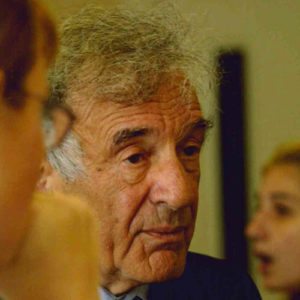Elie Wiesel once said, “There is divine beauty in learning. … Others have been here before me, and I walked in their footsteps. I am the sum total of their experience and their quests.”
To learn from Elie Wiesel was to learn to be a better, more compassionate and engaged human being. To learn from Elie Wiesel was to learn to never be silent, to speak for those different and underprivileged, for the outcasts and downtrodden upon. The message of his books and his life’s work could never be more relevant than today—when there is so much hate, so much misunderstanding, so much fear and anger. As in politics, as it is seemingly everywhere else, it is black vs. white, us vs. them. Think of the Black Lives Matter movement, the senseless shooting at a Florida night club of gays and supporters, of the blue-collar disenfranchised voters of Donald Trump and Bernie Sanders, etc. Where, I often wonder, is the positive news of people coming together, despite differences, of people learning to let go of hate, prejudice and ignorance?
It has been said that to change the future, one must first look at the past. This is something Elie Wiesel taught in class, as well. Both my one-on-one with him and my class with him, where I read many of his books, served as a warning about the nature of prejudice and ignorance, and the hope of coming together and being compassionate. I have never gained so much empathy for, and motivation to help, the marginalized as I did from Elie Wiesel’s unique, painfully beautiful voice—a first-person perspective of the Holocaust and all its horrors.
My best memory is of my one-on-one meeting with him, about midway through the class term [in 2009]. I had so many questions for him, but the minute I saw him, I promptly forgot every one. He was a small man, but his presence was so enormous it overtook the whole room, including me. He looked me square in the eye, and I saw such determination and dignity, strength and sadness, mixed with a gentle warmth. Overwhelmed, I felt the pain and despair, the hope and courage, of his books and of his life. I felt the guilt of being half-German. I fell to tears as I explained my heritage to Elie Wiesel. How could my people have done this?
In WWII, one of my grandpas was a Nazi. I don’t know much about it; my family never talks about it. I hesitate to even mention it, out of respect for my family. They are not horrible people who hate Jewish people. They are good, kind Christian people who show how to love unconditionally in an amazing way. Yet, I had to tell Professor Wiesel. I couldn’t reconcile the kind people I knew with this image of the Holocaust and the horror it produced. I felt somehow personally responsible.
Elie Wiesel wrapped me in a warm hug that had all the strength of his soul, spirit and mind. “You need not cry,” he said. “You are forgiven. But you are blameless in this. You are not responsible for the sins of your fathers—no German child is. If there is one lesson in my work it is this: The only way to heal is through acknowledgment of the tragedy and forgiveness.”
Professor Wiesel went on to ask me about my own dreams and hopes and inspire me to strive for them. At the time, I wanted to be a professor of literature and was hoping to get at least a Master’s in Literature. Elie Wiesel gave me confidence in my writing and also encouraged me to come to Boston University and apply for scholarships. He said he would be honored to be my mentor there. Sadly, though, this never came to pass. I didn’t have the money, and in spite of the confidence Professor Wiesel gave me, I was still too insecure to apply for scholarships as I should have.
I will always regret this missed opportunity. However, on a brighter note, Elie Wiesel has still forever left his mark on my life, through greater respect for those who are different than myself, through seeking further knowledge of different cultures and points of view (I have studied in Europe and still love to read about other cultures/perspectives), and through activism (I have volunteered with Habitat for Humanity and have worked as a mentor for those with disabilities at Disability Network). In fact, at Disability Network, I was part of a summer program where I oversaw a group of disabled individuals and taught them about activism and how to advocate for themselves.
I had two months with Elie Wiesel. I wish I’d had at least 20 years. What a true inspiration, visionary, and what a way to help a shy girl come out of her shell, give more of herself and keep on writing. In fact, thanks to writing my memories of Elie Wiesel, I intend to get back to writing regularly. I hope to write about those who themselves feel like outcasts, who feel disenfranchised or marginalized—from blue-collar workers to African Americans to the poor. I hope I can continue to volunteer but now, in honor of Elie Wiesel, also use my writing to help bring about greater change.
—Kalina Dolejsi ’11


